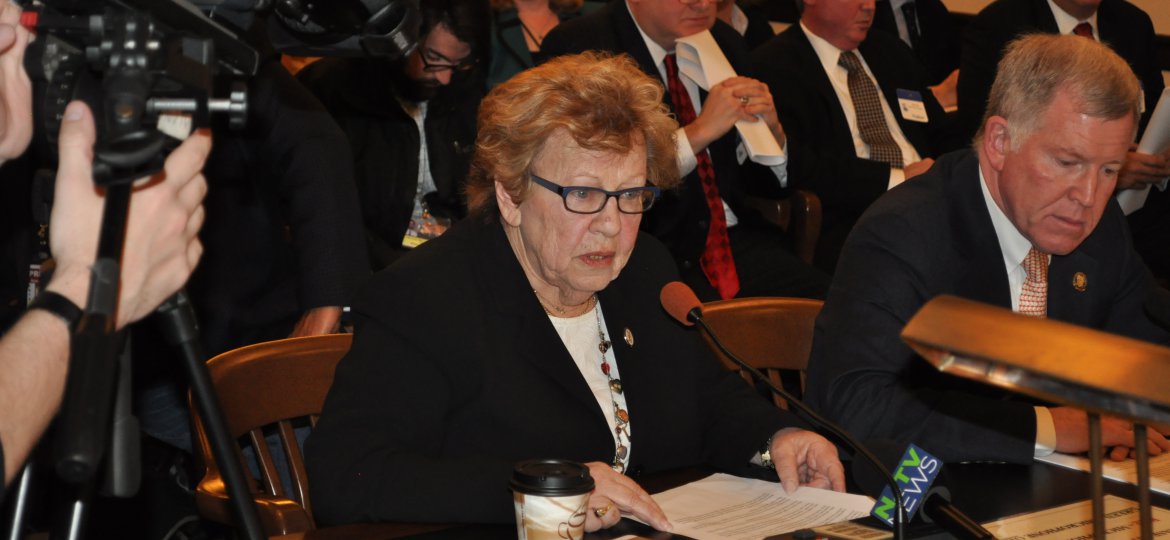
Compromise Measure Drafted in Consultation With Sponsor of New York Port Authority Bill
TRENTON – The Senate today approved legislation sponsored by Senator Bob Gordon and Senate Majority Leader Loretta Weinberg to provide legislative oversight of the Port Authority of New York and New Jersey.
The bill (S-708) passed the Senate 24-9 and now goes to the Assembly for approval.
The legislation incorporates the management, ethics and transparency reforms included in the New York Port Authority bill that New York Gov. Andrew Cuomo signed in December, but adds legislative oversight, capital project monitoring and labor protection provisions negotiated with Assemblyman James Brennan (D-Brooklyn), the lead sponsor of the New York bill. Brennan is introducing identical legislation in New York.
“The Port Authority is not only going to be responsible for building a new Port Authority Bus Terminal, but also is being entrusted with the lead role in coordinating the construction of the new Gateway Rail Tunnel and expansion of the Northeast Corridor,” said Senator Gordon (D-Bergen/Passaic). “These projects are critical to New Jersey’s future, and it is crucial that we have the ability to monitor the cost and progress of these and other projects on an ongoing basis in the years ahead.”
“Legislative oversight is of overriding importance,” said Senator Weinberg. “Transportation experts who testified before the Senate Legislative Oversight Committee agreed unanimously that legislative oversight needed to be the cornerstone of any legitimate Port Authority reform bill. Legislative oversight is public oversight, and history shows that no agency needs oversight more than the Port Authority.”
The compromise legislation gives the New York and New Jersey Senate and Assembly the right to require the appearance of the Port Authority’s chair or vice-chair, chief executive officer, chief fiscal officer and any other staff for up to two committee hearings each year before each legislative body.
“Giving New Jersey Senate and Assembly committees the right to hold two hearings each provides sufficient opportunity to hold separate hearings in each state not only on the overall capital budget, but on specific projects such as Gateway or the new bus terminal during the course of a year,” said Senator Gordon.
Gordon and Weinberg rejected the argument that the New Jersey Legislature should simply go along with less-comprehensive legislation that New York’s governor and legislature hurriedly approved after a week of closed-door negotiations last June without holding any public hearings.
“We were elected by the people of New Jersey, not the people of New York, and we should not feel under any obligation to simply go along with what New York wants,” said Senator Weinberg, who noted that New Jersey’s bill was developed after the Senate Legislative Oversight Committee held four public hearings in the fall.
The Gordon-Weinberg legislation includes a section suggested by New Jersey transportation experts that requires the Port Authority to give 60 days’ advance notice and to hold public hearings in each state prior to the adoption of a new 10-year capital plan, and to conduct a public hearing every three years providing a capital status update on the progress and costs of all projects.
The bill also requires independent monitoring of all capital projects costing more than $500 million – a category that would include the new Port Authority Bus Terminal, the Gateway Rail Tunnel and other major projects.
The legislation requires 60 days’ notice of the issuance of debt by any subsidiary corporation set up by the Port Authority, an important requirement with the Port Authority likely to set up a subsidiary in conjunction with Amtrak and the U.S. Department of Transportation to build the Gateway Tunnel.
It also includes language requested by Port Authority unions requiring investigations to be conducted in accordance with procedures established in existing labor contracts.

